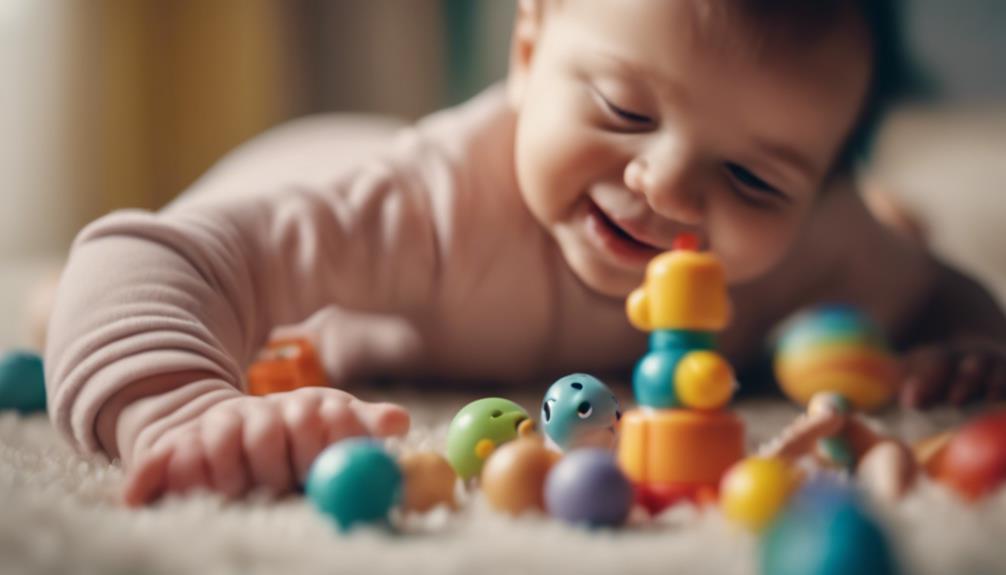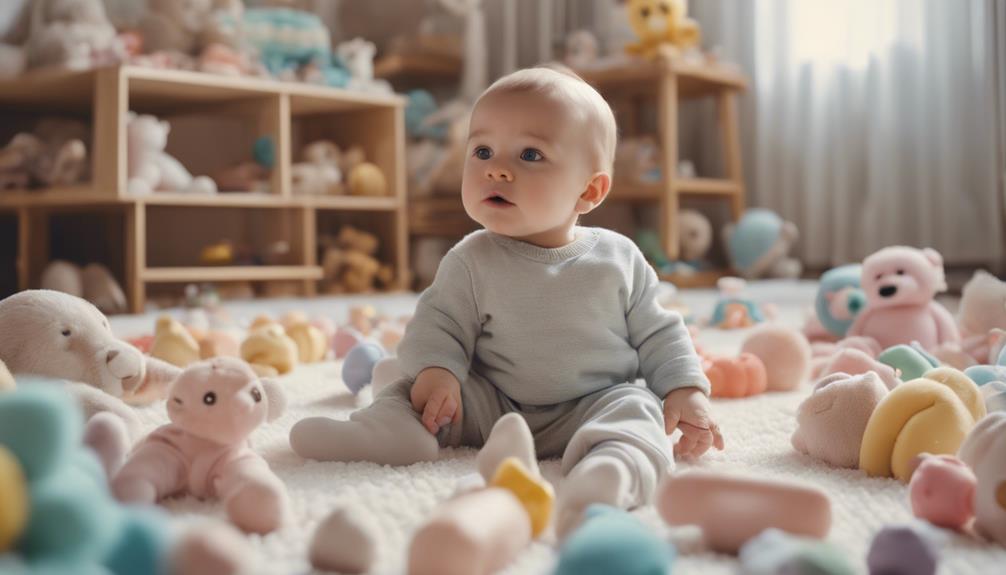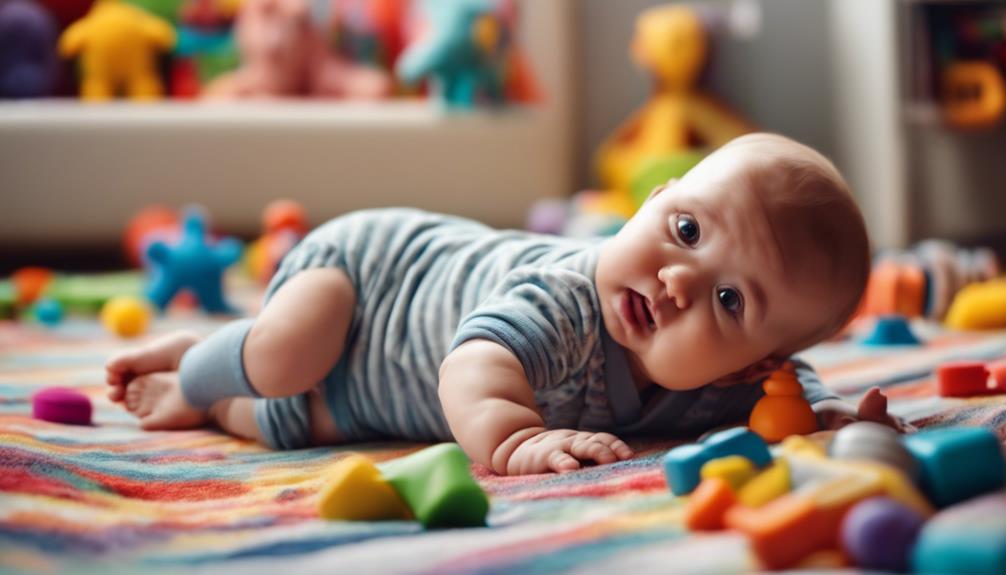To help your baby’s mind and body develop, participate in sensory experiences such as exploring different textures and playing with high-contrast toys. Activities like peek-a-boo and finger painting can aid in cognitive development. It’s important to prioritize physical movement by dancing and incorporating baby yoga into your routine. Responding to your baby’s sounds can help encourage communication, while using simple language can introduce new vocabulary. Cause-and-effect toys are useful for developing reasoning and problem-solving skills. Affection and timely responses are crucial for brain development. Create a nurturing environment by showing love, providing age-appropriate toys, and ensuring a safe space for exploration. Finding a balance between stimulation and quiet periods is beneficial for your baby’s overall growth. Keep exploring new ways to support your baby’s development.
Key Takeaways
- Engage in sensory play for cognitive development.
- Incorporate interactive activities for bonding.
- Promote physical movement for coordination.
- Encourage language development through communication.
- Use cause-and-effect toys for cognitive reasoning.
Sensory Experiences for Baby
Engage your baby in sensory experiences to stimulate their developing senses and cognitive skills. Introducing your little one to various textures through touch or play can enhance their sensory development.
Skin-to-skin contact not only fosters a strong bond but also provides tactile stimulation vital for your baby's sensory awareness. High-contrast toys, with their bold patterns, capture your baby's visual attention, aiding in visual sensory stimulation. Additionally, incorporating soothing music can offer auditory sensory input, enriching your baby's sensory experiences.
Encouraging tummy time is another essential aspect of sensory development. This position helps strengthen your baby's neck and back muscles while allowing them to explore their surroundings from a different perspective, stimulating various senses and promoting motor skills.
Moreover, natural light exposure can positively impact sensory development in babies, so providing opportunities for your little one to experience natural light can be beneficial for their overall sensory growth.
Interactive Activities for Development

To enhance your baby's cognitive development, engage in interactive activities that stimulate their senses and foster bonding. Activities like peek-a-boo and patty-cake not only entertain but also help in building important cognitive skills.
Playful Sensory Experiences
Enhance your baby's cognitive development and sensory experiences through playful interactive activities that stimulate their mind and body.
Engaging in sensory play, such as finger painting, textured toys, and water play, can help stimulate your baby's senses and promote cognitive development.
Incorporating music, rhythmic movements, and dancing into your playtime routine can further enhance your baby's sensory experiences and encourage body coordination.
Providing a variety of materials with different textures, temperatures, and scents allows your baby to explore and experience diverse sensory stimuli.
Sensory bins filled with items like rice, beans, or sand offer tactile experiences that aid in fine motor skill development and sensory stimulation.
Additionally, creating a sensory garden or outdoor play area with safe plants, flowers, and natural elements can provide your baby with opportunities to engage their senses and connect with the natural world, further enriching their sensory experiences and overall development.
Bonding Through Play
By participating in interactive play activities with your baby, you can strengthen your bond and support their cognitive development.
Bonding through play is an essential aspect of your baby's growth, fostering a deeper connection while stimulating cognitive development.
Engaging in interactive play activities such as peek-a-boo and patty-cake not only brings joy but also helps in promoting learning.
Utilizing colorful books and toys with interactive elements can engage your baby's senses, further enhancing their cognitive skills.
Incorporating music, nursery rhymes, and body motions into playtime can aid in language development and improve motor skills.
Encourage exploration and interaction with toys that challenge problem-solving skills, allowing your baby to understand cause-and-effect relationships.
Additionally, responding promptly to your baby's cues and providing emotional security through attentive interactions are essential for strengthening your bond during playtime.
Embrace these interactive activities to create meaningful experiences that support both bonding and cognitive development.
Exploratory Toys and Objects

When selecting toys for your baby, opt for items with various textures and shapes to engage their senses and promote tactile stimulation.
Introduce objects that feature contrasting colors and patterns to enhance their visual development and cognitive skills.
Choose toys that make sounds or music to stimulate their auditory senses and foster early language development.
Safe Toy Selection
Selecting exploratory toys and objects for your baby involves choosing items that encourage interaction and sensory exploration. When considering safe toy selection, prioritize toys that stimulate your baby's senses and promote cognitive development. Opt for toys like stackable blocks and shape sorters that not only entertain but also engage your baby's brain in problem-solving and learning.
Provide a variety of textures, colors, and sounds to enhance sensory experiences and keep your child interested. Remember to avoid toys with small parts or sharp edges that could potentially be a choking hazard. It's essential to regularly rotate toys to maintain your baby's interest and introduce new learning opportunities.
Sensory Exploration Activities
Introduce your baby to a variety of sensory exploration activities using different textures, sounds, and shapes to stimulate their developing senses and cognitive skills.
For visual development, opt for high-contrast toys and objects that capture your baby's attention and support their growing ability to distinguish between shapes and patterns.
To enhance tactile stimulation, offer toys with a range of textures such as soft, rough, smooth, and bumpy, encouraging your baby to explore and feel different sensations.
Engaging your baby's auditory senses is vital for brain development; provide toys that produce various sounds like rattles, musical toys, or crinkly objects to captivate their interest and promote sensory awareness.
Additionally, introducing objects of different shapes and sizes can help enhance your baby's cognitive skills by encouraging them to explore and manipulate their surroundings.
Remember to engage your baby in sensory play with safe and age-appropriate materials to support their overall development.
Playful Learning Experiences
Encourage your baby's development through playful learning experiences by providing a variety of exploratory toys and objects that stimulate their senses and curiosity.
Introducing your child to rattles, soft blocks, and textured balls can enhance their sensory exploration and promote cognitive development. Opt for objects with diverse colors, shapes, and sizes to engage your baby's curiosity and facilitate learning.
Select toys that produce sounds or have moving parts to boost their motor skills and keep them entertained. Remember to rotate the toys regularly to maintain your baby's interest and prevent overstimulation, fostering continued learning and engagement.
While your baby explores these playful learning experiences, make sure to supervise their playtime to guarantee their safety and observe their reactions and interactions for the best developmental benefits.
Encouraging Physical Movement

To enhance your baby's physical movement and coordination, prioritize activities such as crawling, rolling, and reaching for objects. These actions play an important role in your baby's physical development, strengthening muscles and improving motor skills.
Engaging in interactive activities like dancing, clapping, and baby yoga can also promote movement and balance. Providing space for your baby to explore freely is essential in fostering these skills. Utilizing soft toys, play gyms, and baby swings can further stimulate their coordination and balance.
Additionally, incorporating outdoor play and taking walks in a stroller introduces new environments and enhances sensory experiences. By encouraging these activities, you aren't only supporting your baby's physical development but also providing them with opportunities to explore and interact with the world around them.
Prompt Responses and Affection

When your baby seeks your attention through cues, responding promptly and showing affection can help strengthen your bond and nurture their emotional well-being.
Prompt responses to your baby's needs not only build trust but also create a sense of security and comfort essential for their brain development.
Engaging in stimulating interactions like smiling, making eye contact, and cuddling are vital for fostering emotional bonding and overall well-being.
Affectionate responses such as gentle touch and positive social interactions play a significant role in creating a nurturing environment for your baby to thrive.
Language Development Strategies

Engaging with your baby through interactive language activities is essential for fostering early communication skills.
To promote your baby's language development effectively, consider the following strategies:
- Respond to Your Baby's Sounds: Encourage communication by responding to your baby's coos and babbling. This back-and-forth interaction lays the foundation for language skills development.
- Utilize Simple Language: Use simple words, phrases, and nursery rhymes to expose your baby to language. This helps familiarize them with different sounds and patterns.
- Engage in Conversations: Narrate your activities and engage in interactive communication with your baby. This practice not only introduces them to vocabulary but also promotes the development of essential communication skills.
Attention and Reasoning Skills

Enhancing your baby's attention and reasoning skills involves engaging in interactive activities that stimulate their cognitive abilities. By incorporating cause-and-effect toys into playtime, you can help develop their problem-solving skills and cognitive reasoning.
Activities like peek-a-boo and stacking blocks can also aid in enhancing attention and reasoning skills. Talking to your baby about daily routines not only introduces structure and familiarity but also supports their cognitive reasoning development.
Introducing new sounds and objects into your baby's environment can promote curiosity and further enhance their reasoning capabilities. Creating a consistent and nurturing environment is vital in supporting cognitive growth and reasoning development in babies.
Protection From Overstimulation

To protect your baby from overstimulation, it's crucial to be mindful of their environment and the stimuli they're exposed to.
Here are three key strategies to prevent overstimulation and support your baby's developing brain:
- Limit excessive noise and bright lights: Loud sounds and harsh lighting can overwhelm your baby's senses, leading to overstimulation. Create a calm and soothing environment by reducing noise levels and using soft, muted lighting to help your baby stay relaxed and focused.
- Control the number of toys and activities: Too many toys and activities can flood your baby's developing brain with too much information. Limit the stimuli to prevent overwhelming your baby and allow them to engage more deeply with their surroundings.
- Observe and respond to your baby's cues: Pay close attention to your baby's reactions to different stimuli. Look for signs of discomfort or overstimulation, and adjust the environment accordingly to make sure your baby feels safe and secure.
Balancing stimulation with quiet periods can help your baby process information effectively and support their overall development.
Creating a Nurturing Environment

Establishing a nurturing environment for your baby involves providing love, attention, and emotional support to stimulate their mind and body effectively. Creating a safe and secure space for your little one to explore and interact with their surroundings is essential for promoting brain development and overall well-being.
Engaging in interactive play, such as peek-a-boo and singing nursery rhymes, not only stimulates your baby's mind but also strengthens the bond between you and your child. Introducing age-appropriate toys and activities that encourage sensory exploration and motor skills development can further enhance your baby's growth and cognitive abilities.
Frequently Asked Questions
How Can I Stimulate My Baby's Brain?
You can stimulate your baby's brain by engaging in interactive play with toys, incorporating language-rich activities, providing sensory experiences, encouraging physical activities, and creating a consistent routine and environment for cognitive growth and emotional bonding.
How to Increase IQ Level of Baby?
Boost your baby's IQ by engaging in interactive activities, providing a stimulating environment, encouraging physical movement, offering educational toys, establishing routines, and being responsive to their cues. These practices contribute to cognitive development and intelligence.
How Can I Stimulate My Baby's Cognitive Development?
To stimulate your baby's cognitive development, engage in interactive activities like peek-a-boo and introduce new sounds and objects. Maintain a consistent routine and communicate regularly to foster language skills. Choose toys that enhance problem-solving abilities for best growth.
How Can I Improve My Baby's Brain Development in the Womb?
You can enhance your baby's brain development in the womb by maintaining a healthy lifestyle, avoiding harmful substances, engaging in activities like parentese, using colorful books, and incorporating touch and physical interaction for best growth.
How Can I Stimulate My Baby's Right Brain?
To stimulate your baby's right brain, engage in creative activities like music, art, and storytelling. Encourage non-verbal communication through gestures and facial expressions. Provide a sensory-rich environment with textured toys and colorful visuals.
Conclusion
To wrap up, by engaging in sensory experiences, interactive activities, and providing a nurturing environment, you can effectively stimulate your baby's mind and body.
Encourage physical movement, language development, attention and reasoning skills, while safeguarding them from overstimulation.
Remember, creating a balanced approach with exploratory toys and objects, prompt responses, and affection will support your baby's overall development.
Stay consistent and observant to guarantee ideal growth and well-being.










